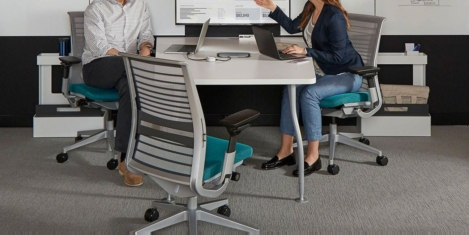April 26, 2017
Requests to work remotely increase as stigma around flexible working diminishes 0
 A majority of workers (65 percent) now feel comfortable requesting to work from home, while a third (33 percent) of UK employees would decline a job offer if they weren’t able to work flexibly. This is according to a new study from Maintel which claims that today’s multi-generational workforce prefers flexible working to traditional office hours and location; with flexible work policies perceived as an important workplace benefit. Nearly three quarters (73 percent) of respondents say the company they work for has good flexible work policies in place, 64 percent of remote workers don’t feel micromanaged, and 58 percent would take the opportunity to spend even less time in an office, if it were available. Well over half (60 percent) of respondents believe technology can replace in-person interaction in the workplace. Yet there remain challenges with flexible work, including indifference regarding the security of company data (66 percent) and distractions at home (31 percent).
A majority of workers (65 percent) now feel comfortable requesting to work from home, while a third (33 percent) of UK employees would decline a job offer if they weren’t able to work flexibly. This is according to a new study from Maintel which claims that today’s multi-generational workforce prefers flexible working to traditional office hours and location; with flexible work policies perceived as an important workplace benefit. Nearly three quarters (73 percent) of respondents say the company they work for has good flexible work policies in place, 64 percent of remote workers don’t feel micromanaged, and 58 percent would take the opportunity to spend even less time in an office, if it were available. Well over half (60 percent) of respondents believe technology can replace in-person interaction in the workplace. Yet there remain challenges with flexible work, including indifference regarding the security of company data (66 percent) and distractions at home (31 percent).







 A major research study into Health and Wellbeing in offices has been launched by the British Council for Offices (BCO). “Wellness Matters: Health and Wellbeing in offices and what to do about it” is a year-long project which aims to provide definitive guidance on how to enable office Health and Wellbeing across a building’s lifecycle. The major research study has been commissioned to critique existing Health and Wellbeing measurement and certification, identify the most recent and relevant medical evidence justifying a proactive approach to Health and Wellbeing in the built environment, and give guidance on the business case for investment in this space beyond simply improving productivity. Most significantly, this research aims to deliver a practical guide to creating a healthy environment across the different stages of a building’s life cycle, from design, construction and leasing to the most important aspect by time and value: occupation and asset management.
A major research study into Health and Wellbeing in offices has been launched by the British Council for Offices (BCO). “Wellness Matters: Health and Wellbeing in offices and what to do about it” is a year-long project which aims to provide definitive guidance on how to enable office Health and Wellbeing across a building’s lifecycle. The major research study has been commissioned to critique existing Health and Wellbeing measurement and certification, identify the most recent and relevant medical evidence justifying a proactive approach to Health and Wellbeing in the built environment, and give guidance on the business case for investment in this space beyond simply improving productivity. Most significantly, this research aims to deliver a practical guide to creating a healthy environment across the different stages of a building’s life cycle, from design, construction and leasing to the most important aspect by time and value: occupation and asset management.

























March 30, 2017
Social technology has the power to make the workplace more humane
by Amanda Sterling • Comment, Technology, Workplace
(more…)